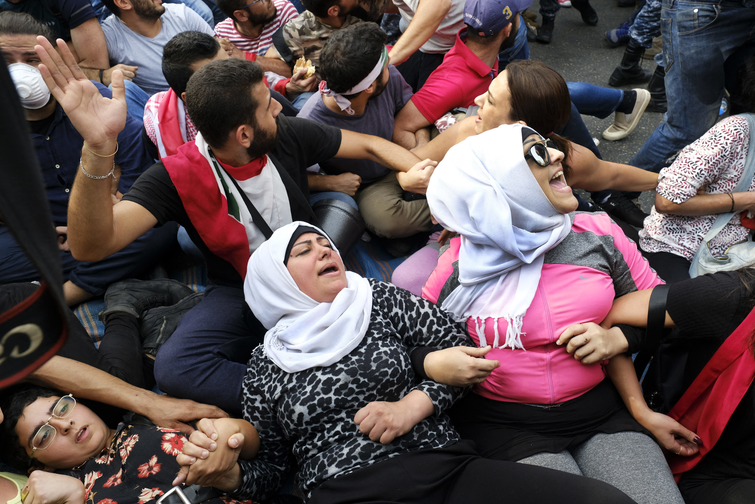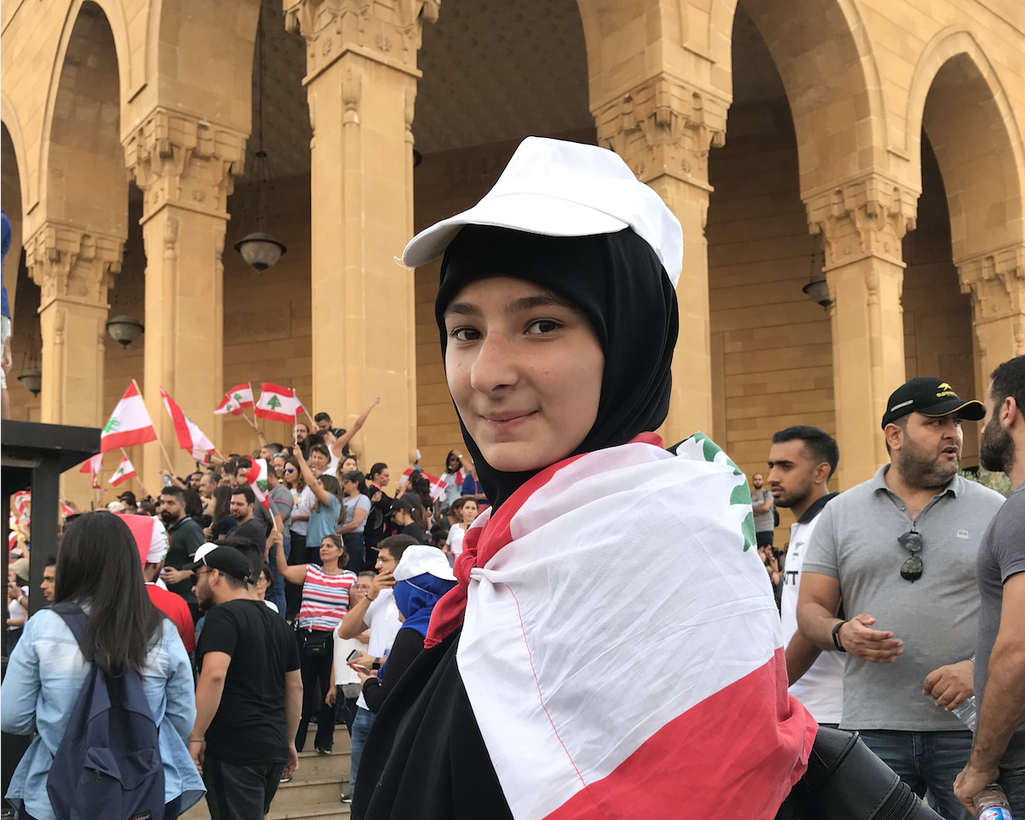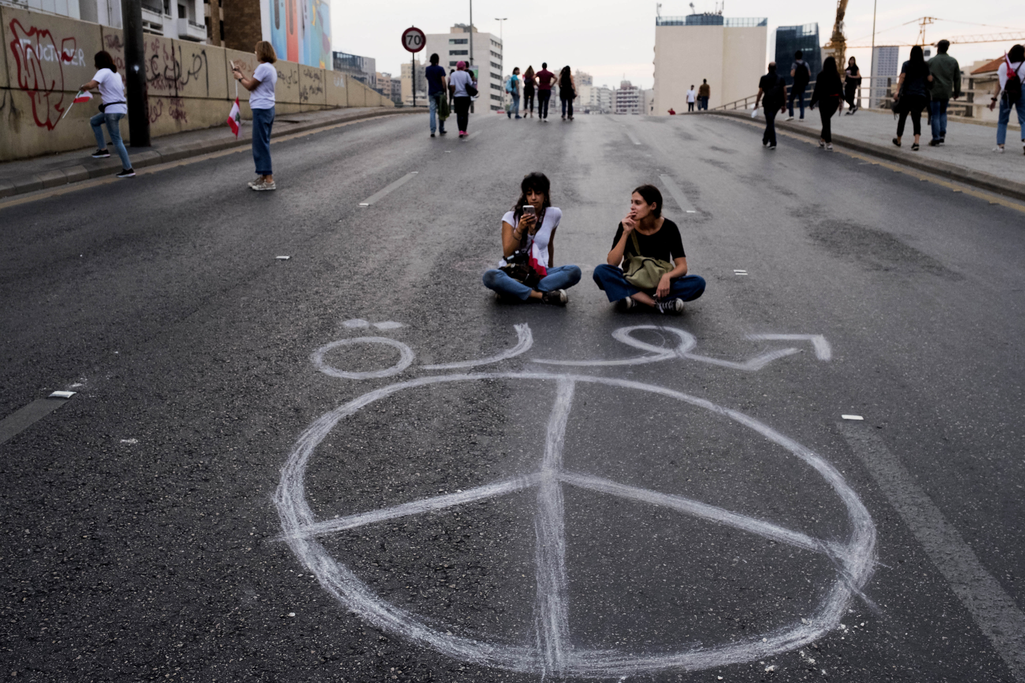

“If there were no women, I don’t think the revolution would have happened”, Stephanie Sotiry told me. The 34-year-old teacher and artist was easy to spot on the frontlines of recent, daily protests in Beirut, the Lebanese capital, amidst the historic wave of demonstrations across the country.
Sotiry joined the protests with her tambourine from day one, making music, singing and dancing with other young activists and artists. Although the atmosphere was often light, the demonstrations have been far from trivial. On 29 October, they forced the resignation of Prime Minister Saad Hariri.
I met Sotiry in early November, in the second week of the demonstrations that are still ongoing. Hundreds of thousands of people across the country have protested against the sectarian political system and entrenched economic crisis, and called for the ruling elite to step down.
Standing by a roadblock with other protestors, the artist described how “women were preventing fights amongst men during the protests. We would call women to the frontlines in order to de-escalate violence, and it ended up adding a very poetic touch to the revolution.”
While the protests have taken on different forms across the country, reporters have also noted the diversity of participants – in class, religion and gender. Journalists have recognised women, for example, for their role in pacifying protestors and police, leading frontlines, and inspiring others.
Young women, in particular, have played an active and vocal role in the demonstrations and their presence, participation and visibility in the protests have inspired the Lebanese population and the world.
“The most important people who participated in the protests are women. We closed roads together. We sat down in front of the police”
In Beirut, 18-year-old student Zahraa Mossawi told me about her experience at Martyr’s square, during the first week of protests.
“This is my first time going to a protest, but it won’t be the last time. We are here to take back our rights – all of us here are from all ages, all regions, all sects, and we want to have a safe country and good leaders”, she said.
I also met Tatiana Lahoud, 19. A university student, she and her friends said were protesting against corruption in the country and its politics. She explained: “These [ruling] political parties are paying for votes, and the same politicians have been in power for more than 30 years”.
“Before, maybe my generation didn’t have the desire to enter into traditional politics, but I think after these protests, maybe we will. I want an honest future and I also want to succeed as a woman in this society”, she added.
“Lebanese society is very patriarchal, and I want women… in all sectors of society – government, business, school, and work”.

Israa Sefawi, 25, talked to me at a café, after returning from a day of protests with her husband. “I have a new baby, and me and my husband both don’t have a job. The entire government is corrupt and don’t think about citizens”, she said, explaining their participation.
“But young women are playing a role in changing things”, Sefawi added, pointing as an example to Paula Yacoubian, “an elected young woman in the government standing for us. We want more young women and men in the government – we are calling for new elections”.
Yacoubian ran in last year’s parliamentary elections, on an independent platform, and was one of the six women elected that year out of the 128 member legislature. She has been outspoken against the sectarian system.
Women journalists have also noted the significance of women in these protests. “Lebanese women are breaking taboos to be face of protests”, was the headline of an article by Sunniva Rose in The National, an English-language news organisation from the United Arab Emirates.
“It’s not called the women’s revolution for nothing”, tweeted Luna Safwan, a VICE Arabia reporter based in Beirut. “Lebanon’s diverse women have been on the frontlines of the #LebanonProtests since day 1”.
“Diversity has proven to be a key component [of the demonstrations],” she continued, describing how “women of all sects, colours, backgrounds, social statuses, educational backgrounds are leading in one way or another. Shared responsibility, standing against the police. Power!”
“It’s not called the women’s revolution for nothing”
On 3 November, feminist groups marched to Riyad el Solh in Beirut, insisting that the uprising will not compromise on gender equality, social justice, and women’s rights. With banners stating “revolution is a woman”, they chanted: “Feminists revolt, revolt against the patriarchal system”.
The explicitly feminist protestors added a list of demands to the protests. “We want equal rights, civil rights, equal pay, less abuse, assault, harassment and sexual violence”, said Sarah Abou Jaoudeh, 28.
“Women are not considered equals in Lebanon, just look at the nationality law that prevents women from giving her nationality to her own children,'' she said, adding that women “have always been present in protests”, including those to “demand equality in the Lebanese constitution”.

Internationally, Lebanese women are often assumed to have more rights and freedoms than other women in the Arab world. But the country has also been criticised by human rights groups and commentators, for laws that are “sexist” and leave women “unequal and unprotected”.
According to a scathing 2015 report from the international NGO Human Rights Watch, for instance, Lebanon’s personal status and citizenship laws make it more difficult for women to divorce and gain child custody, while also providing them with “inadequate protection from domestic violence”.
This is the context in which the leadership and participation of women has left an indelible mark on these protests. They have expanded demands beyond revising the sectarian political system, and uniting citizens across class and religions, to directly and broadly challenging patriarchy too.
Whether this energy will fuel a full-blown feminist revolution is uncertain, but the Lebanese women I spoke to in Beirut said it would be hard to forget how they have participated and led the frontlines of these protests.
“I am normally very scared of violence, but I felt beautiful on the frontlines, and very confident. It’s also a revolution within”, Sotiry told me in Martyr’s Square, explaining how “the revolution is changing me. It’s making me hope, and feel less scared in places that are still scary”.
Read more
Get our weekly email

Comments
We encourage anyone to comment, please consult the oD commenting guidelines if you have any questions.